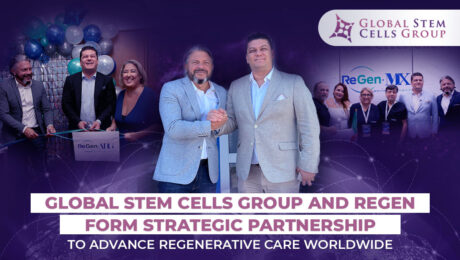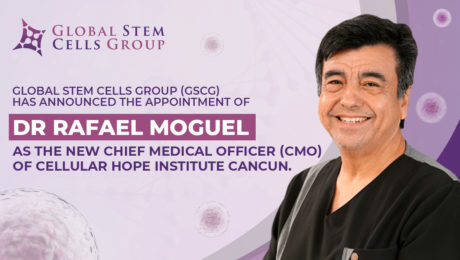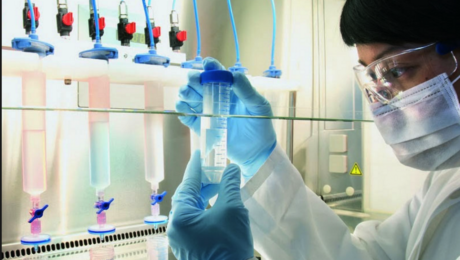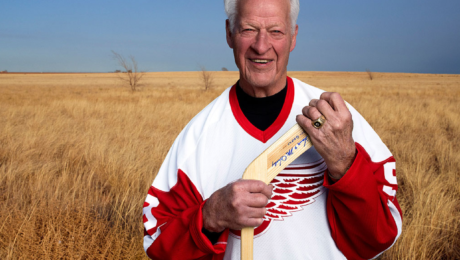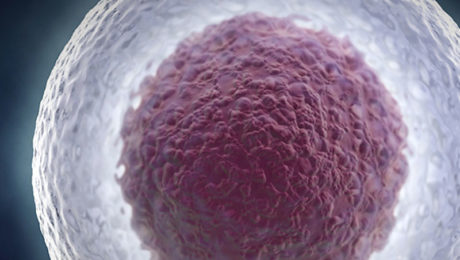Global Stem Cells Group and ReGen Form Strategic Partnership to Advance Regenerative Care Worldwide
Global Stem Cells Group, a leader in the field of regenerative medicine, proudly announces an innovative partnership with ReGen, a highly acclaimed Turkish clinic renowned for its cutting-edge technologies in aesthetic and regenerative care. This strategic alliance exemplifies Global Stem Cells Group’s commitment to advancing the field of regenerative medicine and expanding global access to transformative treatments.
As a trailblazer in the industry, Global Stem Cells Group actively seeks strategic partnerships with companies and organizations that share its vision of advancing regenerative care. The collaboration with ReGen signifies a remarkable milestone in this endeavor.
A Solid Partnership
ReGen, a highly regarded clinic specializing in advanced regenerative care technologies, has joined forces with Global Stem Cells Group to facilitate the expansion of franchising opportunities for specialized regenerative care clinics worldwide. By harnessing the collective strengths of both organizations, this partnership aims to cultivate an environment where their shared expertise and services can flourish, delivering regenerative healthcare solutions to individuals across the globe.
Rapid Growth
Through the partnership, ReGen has experienced remarkable growth, leveraging the Global Stem Cells Group’s name and resources to open two state-of-the-art clinics in Buenos Aires, Argentina, and Cancun, Mexico. These clinics have established themselves as pioneers in the field of regenerative care, surpassing existing alternatives in the region.
By introducing cutting-edge aesthetic treatments such as the perfected hair transplant technique from Turkey, ReGen is revolutionizing the landscape of regenerative healthcare. The clinics now offer patients access to the latest and most effective treatment options available. ReGen’s ability to bring their expertise to new regions underscores Global Stem Cells Group’s vision of making their exceptional services accessible to individuals worldwide.
The Trained Expert Behind ReGen
Leading the way at ReGen is Dr. Salih Yildirim, an esteemed CEO with a visionary mindset committed to spearheading a paradigm shift in the realm of regenerative medicine. Driven by an unwavering passion to extend the benefits of cutting-edge aesthetic technologies hailing from Turkey, encompassing areas such as hair transplantation, rhinoplasty, mammoplasty, and stem cell treatments, he has taken the momentous decision to expand the global presence of ReGen clinics. This strategic alliance with the esteemed Global Stem Cells Group aims to grant greater accessibility to Turkey’s esteemed aesthetic and regenerative medicine treatments, catering to a broader spectrum of patients.
Evident in this initiative is ReGen’s resolute dedication to disseminate its advanced techniques and state-of-the-art technologies across the globe, thereby propelling progress in the field of regenerative medicine.
How Global Stem Cells Group Can Improve ReGen’s Reach
While ReGen brings its advanced techniques and expertise to the partnership, Global Stem Cells Group offers a range of valuable resources. As a conglomerate of companies engaged in product manufacturing and comprehensive training through the International Society for Stem Cell Application (ISSCA), Global Stem Cells Group enhances the partnership’s outreach and impact. This collaboration has the potential to be life-changing for individuals seeking regenerative care worldwide.
Dr. Yildirim expresses his satisfaction with the partnership, stating, “We are delighted to join forces with Global Stem Cells Group. This collaboration allows us to establish additional points of care globally, furthering the accessibility of stem cell applications and advancing regenerative medicine.”
This milestone partnership between Global Stem Cells Group and ReGen is destined to reshape the world of regenerative care. It represents a turning point that will be remembered as a transformative moment for the field of regenerative medicine.
Benito Novas, CEO of Global Stem Cells Group, emphasizes the significance of this alliance, stating, “Our collaboration with Dr. Yildirim spans several years, and he has consistently demonstrated exceptional leadership and humility. By incorporating the ReGen program into the Global Stem Cells Group umbrella, which encompasses products manufacturing, ISSCA training, and centers of excellence for point-of-care regenerative medicine, we continue to solidify our commitment to excellence.”
As this partnership evolves, both organizations will continue to work tirelessly to develop new treatments, enhance existing procedures, and ensure the highest standards of patient care. Through their joint efforts, they will accelerate the adoption of regenerative care practices on a global scale, creating a ripple effect that will benefit patients and healthcare providers alike.
For more information about Global Stem Cells Group and its regenerative medicine solutions, please visit https://www.stemcellsgroup.com/.
About Global Stem Cells Group
Global Stem Cells Group is a leading provider of regenerative medicine solutions, dedicated to advancing healthcare through innovative therapies. With a global presence and a multidisciplinary team of experts, the organization strives to harness the potential of stem cells and regenerative medicine to improve patient outcomes across various medical fields. Through its extensive network of clinics, research facilities, and training centers, Global Stem Cells Group is committed to pushing the boundaries of regenerative medicine and making a positive impact on global healthcare.
About ReGen
ReGen is a highly acclaimed Turkish clinic renowned for its expertise in cutting-edge technologies related to regenerative care. Headquartered in Istanbul, ReGen has gained international recognition for its commitment to excellence and its groundbreaking advancements in regenerative medicine. By partnering with Global Stem Cells Group, ReGen aims to share its advanced techniques and expertise on a global scale, improving access to regenerative care and transforming lives worldwide.
Safe Harbor Statement: Statements in this news release may be “forward-looking statements”. Forward-looking statements include, but are not limited to, statements that express our intentions, beliefs, expectations, strategies, predictions, or any other information relating to our future activities or other future events or conditions. These statements are based on current expectations, estimates, and projections about our business based partly on assumptions made by management. These statements are not guarantees of future performance and involve risks, uncertainties, and assumptions that are difficult to predict. Therefore, actual outcomes and results may and are likely to differ materially from what is expressed or forecasted in forward-looking statements due to numerous factors. Any forward-looking statements speak only as of the date of this news release, and The Global Stem Cells Group undertakes no obligation to update any forward-looking statement to reflect events or circumstances after the date of this news release. This press release does not constitute a public offer of any securities for sale. Any securities offered privately will not be or have not been registered under the Act and may not be offered or sold in the United States absent registration or an applicable exemption from registration requirements.
- Published in Press Releases
GSCG Announces the Appointment of Dr. Rafael Moguel as New Chief Medical Officer (CMO) of Cellular Hope Institute Cancun
Global Stem Cells Group (GSCG) has announced the appointment of Dr Rafael Moguel as the new Chief Medical Officer (CMO) of Cellular Hope Institute Cancun.
Dr. Moguel, Fellow of the Society for Cardiac Angiography and Intervention (SCAI), Member of the Mexican Society for Interventional Cardiologists, and Member of the Latin American Society for Interventional Cardiology, comes with a wealth of experience and training.
As CMO with vast knowledge and experience, Dr Moguel is expected to change the direction of Cellular Hope Institute Cancun, which offers patients the best treatments in multiple areas, such as sports medicine, pediatric care, chronic degenerative disease, and autoimmunity. It’s a multi-specialty training center for cellular therapies and regenerative medicine, offering the most advanced treatments in cell therapy.
“I have full confidence in the appointment of Dr Rafael Moguel as the CMO of Cellular Hope Institute Cancun,” said Benito Novas, CEO of Global Stem Cells Group. The CEO also expressed his satisfaction in Dr Moguel’s abilities and experience, and is confident that (Dr Moguel) will advance the objectives of Cellular Hope Institute and propel it to new heights.
With his impressive resume, Dr. Moguel has served in various capacities across several top medical institutions. He was the assistant professor for Cardiology and Interventional Cardiology at Hospital 1° de Octubre, where he also handled hemodynamics and internal medicine.
In his acceptance speech, Dr Moguel said, “I want to affirm and reaffirm my commitment to the goals of Cellular Hope Institute.” With his elaborate working experience and professionalism in cellular therapy, he expressed his confidence in rising to the expectations of Cellular Hope Institute.
Dr. Moguel received his medical degree at Universidad Veracruzana in 1983. He holds a valid certification by the Mexican Cardiology Board for Interventional Cardiology. With more than 10,000 interventional procedures, most notably peripheral and brain intervention, coronary, pacemakers and vein interventions, we believe Dr. Moguel has all it takes to propel Cellular Hope Institute to the next level.
The appointment of Dr. Moguel comes barely two months after an earlier announcement by GSCG about opening the multispecialty regenerative medicine center in Cancun. The facility’s main objective is to incorporate different treatments basing on regenerative medicine, and serve as a training center for cellular therapies and regenerative medicine.
We believe Dr. Moguel’s rich background as an assistant professor and head of interventional cardiology and hemodynamics positions him as the best candidate to run Cellular Hope Institute. His experience is expected to make this facility one of the best cellular therapy centers worldwide, and provide more specialized treatment for patients requiring regenerative medicine.
About Cellular Hope Institute
This facility is a center for both patients and medical experts worldwide, and its main objective is to benefit medical experts and patients globally. The facility achieves this objective through offering the best treatments for patients with multiple conditions, such as spinal cord injury, chronic obstructive pulmonary, sports medicine, and autoimmunity, among others. If you need more information about Cellular Hope Institute, please contact us today.
About the Global Stem Cell Group
Global Stem Cells Group, Inc. is the parent company of six wholly owned operating companies dedicated entirely to stem cell research, training, products, and solutions. Founded in 2012, the company combines dedicated researchers, physician and patient educators, and solution providers with the shared goal of meeting the growing worldwide need for leading edge stem cell treatments and solutions. With a singular focus on this exciting new area of medical research, Global Stem Cells Group and its subsidiaries are uniquely positioned to become global leaders in cellular medicine.
Global Stem Cells Group’s corporate mission is to make the promise of stem cell medicine a reality for patients around the world. With each of GSCG’s six operating companies focused on a separate research-based mission, the result is a global network of state-of-the-art stem cell treatments.
Global Stem Cells Group is a publicly traded company operating under the symbol MSSV. https://finance.yahoo.com/quote/mssv/
To learn more about Global Stem Cells Group, Inc.’s companies visit our website.
- Published in Press Releases
Global Stem Cells Group Subsidiary Adimarket to Launch Progenikine™ SVF Closed System

Global Stem Cells Group subsidiary Adimarket is preparing to launch Progenikine™, a new SVF closed system kit utilizing EmCyte technology, containing all the elements necessary to process adipose tissue and obtain stromal vascular fraction in a sterile environment.
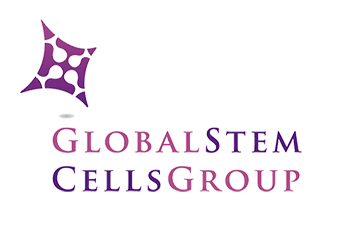
MIAMI, May 31—Adimarket, a subsidiary of Global Stem Cells Group, Inc. is preparing to launch Progenikine™, its new and approved SVF closed system kit using EmCyte technology, and is expected to be available to physicians in July, 2016. The Progenikine kit contains all the elements necessary to process adipose tissue and obtain stromal vascular fraction (SVF) in a closed environment.
Adipose derived stem cells (ASCs) are used by physicians for a variety of indications. Most commonly, ASCs are isolated at the point of care from lipoaspirate (derived from liposuction) tissue as the stromal vascular fraction (SVF), harvested from the patient and immediately administered to the patient as an injection, or used to enrich fat grafts. Isolation of ASCs from adipose tissue is a relatively simple process performed routinely in cell biology laboratories, but isolation at the point of care for immediate clinical administration requires special methodology to prevent contamination, ensure integrity of the clinical procedure, and comply with 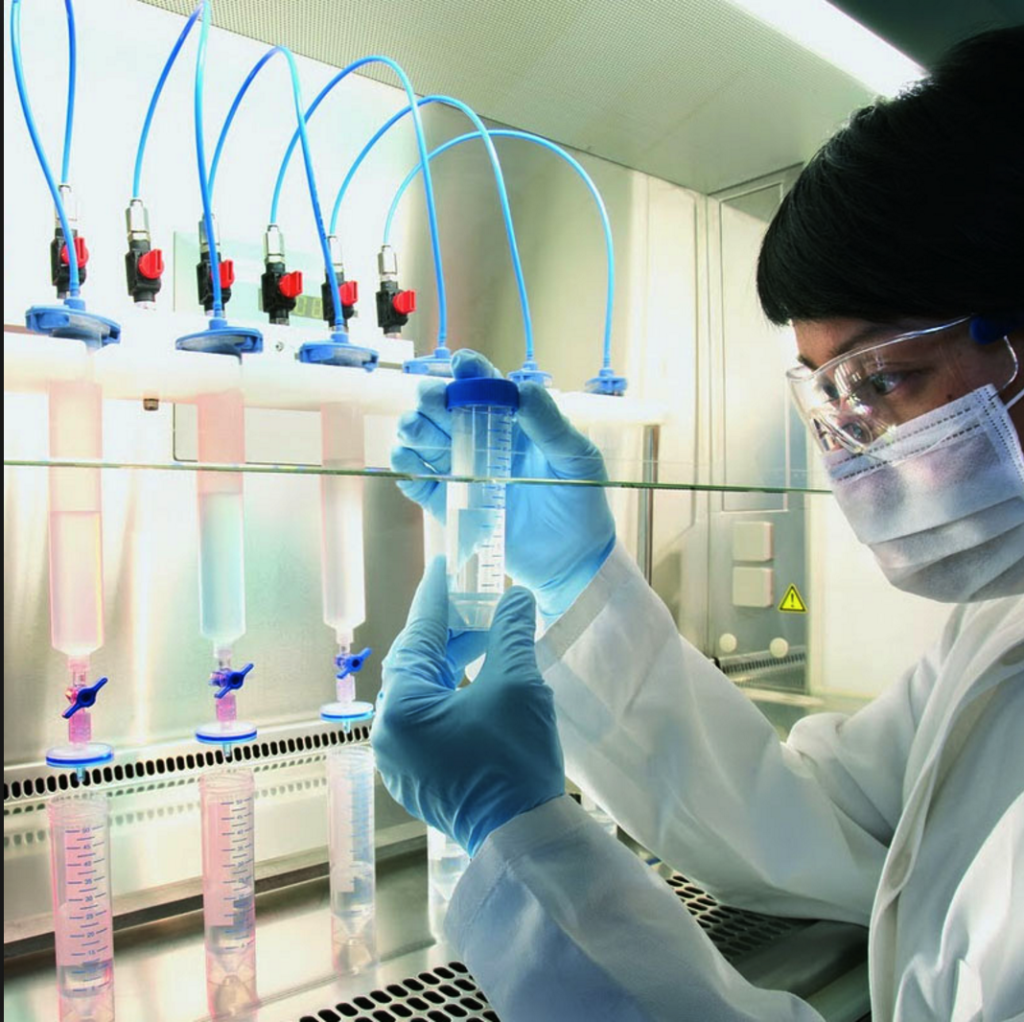 regulatory requirements.
regulatory requirements.
Developed in conjunction with Patrick Pennie, Emcyte CEO, and Maritza Novas Director of Research and Development for Global Stem Cells Group, Progenikine fuses elements from Emcyte systems with the Global Stem cells Group SVF protocols. The kit can provide a low cost, rapid and
simple alternative to traditional methods of isolating ASCs, particularly when smaller quantities are needed.
“We’re excited to launch the Progenikine kit, the newest product designed to help Global Stem Cells Group’s fulfill its m
ission to provide accessible products to our member clients,” says Benito Novas, CEO of Global Stem Cells Group. “These are the milestones that bring us closer to ensuring that more patients will be able to gain access to stem cell therapies.”
To learn more about the Progenikine kit, visit the Global Stem Cells Group website, email bnovas@stemcellsgroup.com, or call 305-560-5337.
About Global Stem Cells Group:
Global Stem Cells Group, Inc. is the parent company of six wholly owned operating companies dedicated entirely to stem cell research, training, products and solutions. Founded in 2012, the company combines dedicated researchers, physician and patient educators and solution providers with the shared goal of meeting the growing worldwide need for leading edge stem cell treatments and solutions.
With a singular focus on this exciting new area of medical research, Global Stem Cells Group and its subsidiaries are uniquely positioned to become global leaders in cellular medicine.
Global Stem Cells Groups corporate mission is to make the promise of stem cell medicine a reality for patients around the world. With each of GSCGs six operating companies focused on a separate research-based mission, the result is a global network of state-of-the-art stem cell treatments.
About Adimarket:
Adimarket, Inc., a division of the Global Stem Cells Group, is a cost-competitive online marketplace for quality regenerative medicine equipment and supplies for physicians and health care professionals.
Adimarket was founded to provide physicians and other health care professionals the tools they need to practice regenerative medicine in a medical office setting. Motivated by a firm belief in the impact the practice of stem cell medicine can have when dispensed in a doctor’s office, Adimarket provides physicians with the tools they need to provide patients with cutting edge treatments.
Adimarket’s experienced customer service representatives provide valuable guidance and advice regarding products relevant to individual practices.
About Emcyte:
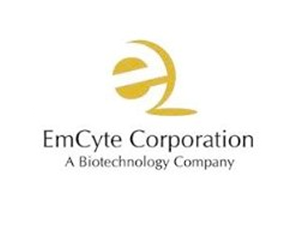
Fort Myers, Florida-based EmCyte Corporation is a leader in autologous cellular biologics with the GenesisCS Component Concentrating Systems. These systems provide patients with the best opportunity for rapid recovery an
d provide practitioners with the most advanced clinical point of care experience. EmCyte systems are developed to meet every clinical requirement, giving the physician better clinical choices. EmCyte devices have been independently reviewed and show to produce buffycoat concentrations of 6x to greater than 10x baseline in 7mLs, with yields ranging from 70 percent to greater than 90 percent
EmCyte technology allows for the safe extraction of concentrated platelets and other regenerative cell types from the patient’s own blood. These cells are then re-suspended in a small volume of the patient’s blood plasma and then applied to the treatment site.
To view this release live online, click here
###
- Published in Press Releases
Gordie Howe’s Stem Cells Treatments Support a Growing Appeal for These Therapies Among Athletes and Baby Boomers
In October, 2014, legendary hockey player Gordie Howe, then 86, was on death’s door after suffering a debilitating acute hemorrhagic, left thalamus stroke. Upon returning home from the hospital, Howe needed someone to lift him from his bed to a wheelchair and back. He couldn’t remember the names of his four children, Marty, Mark, Cathy, and Murray, and his condition continued to grow worse in subsequent weeks. According to an article in New York Magazine, when Mark took his father to get an epidural to relieve his back pain, the attending physician took one look at Gordie and asked Mark if it might be better to just let his father go. On the rare occasion when Gordie did manage to speak, he would tell his children, “Just take me out back and shoot me.”
The man for whom the term “hat trick” was coined, Howe retired from hockey at age 52 after four decades of professional play, having scored more goals than any other NHL player. But over the past 10 years, his health declined dramatically—heart disease, dementia, and spinal stenosis—despite his family’s and physician’s best efforts to find medical solutions. After his stroke, Keith Olbermann aired a preemptive obituary on ESPN. The family made funeral plans. Murray, his youngest son, wrote a eulogy.
Experimental stem cell treatment
Around Thanksgiving, 2015, Howe’s family learned about an experimental stem cell treatment that could save his life. The plan was to inject up to 100 million neural stem cells into his spinal column in the hopes that the stem cells would migrate to his brain and help his body repair itself. Howe could improve within 24 hours, and receive the treatment anytime—just not in the United States. The procedure wasn’t FDA-approved, and Howe would have to receive the treatment at a clinic in Tijuana.
Howe’s son Murray, a radiologist, looked into the treatment and thought it was promising. The real concern was transporting the immobile Howe to Mexico. Daughter Cathy worried that he might die during the treatment, but Mark responded bluntly: “If he does die, what’s the difference? He’s going to be gone soon no matter what.”
While the family weighed the stem cell treatment idea, Howe was admitted to the hospital with severe dehydration, caused by his unwillingness to swallow. When he returned home, he still had no use of his right side, and the family assumed he would never walk again. The Howe children decided to give the stem cell treatments a try.
Two days later, the Howes flew their Dad to San Diego. In the air, Gordie grew agitated and got the attention of a flight attendant, who spent 10 minutes kneeling by his seat trying to understand something he wanted to tell her. Due to his profound memory loss, Howe didn’t know he had suffered a stroke, why he was on a plane, or where he was going. But he remembered one thing, which he managed to whisper to the fight attendant: “I was a pro hockey player.”
The next morning, Marty and Murray drove with their father across the border to Clínica Santa Clarita, where Gordie bent over a table to expose his lower back so that a needle could be inserted into his spinal canal to inject the stem cells. Howe was given two types of stem cells – neural stem cells and mesenchymal stem cells. The second type, derived from bone marrow, has anti-inflammatory properties and secretes chemicals that promote healing.
The procedure then required Howe to lie prone for eight hours. After the eight hours passed, Gordie told Murray he needed to use the bathroom and that he intended to walk there in order to do so. Since the stroke, Gordie had only managed to walk one time—10 steps, with a walker. Murray reminded his Dad that he couldn’t walk.
Recovery milestone after stem cell treatment
Howe stood up, and with Murray’s support, walked for the first time in more than a month—to the bathroom. This milestone became an oft-repeated story among the Howe family, and Gordie’s revival became an irresistible story for the sports pages. Back home, Gordie returned to something resembling the normal life of an 86-year-old. He pushed the grocery cart, helped with the dishes, and could go fishing so long as one of his sons reminded him that a tug on the line meant he needed to start reeling. The family released a video of Gordie standing stationary, firing a puck, five-hole, past his 8-year-old great-grandson. Keith Olbermann apologized for his premature obituary.
Howe’s children now had to figure out how to share his apparent recovery—a debate that proved just as contentious as their decision to fly him to Mexico for the treatment in the first place—with the world. Both Marty and Mark had played in the NHL alongside their father, but now Murray, the doctor, was giving interviews in his hospital scrubs, endorsing his father’s place in medical “miracle” history. He began referring to the stem-cell treatment as the “Gordie Howe Protocol,” and said that his Toledo-based hospital was looking into conducting an FDA-approved study of the procedure. In one interview, Murray Howe stated that “stem cells are the most promising thing in medicine since the discovery of antibiotics.”
As the story spread, the medical community started to question just how miraculous Howe’s recovery had been.
“Companies selling these products are preying on desperate and vulnerable people and exploiting their hope, much like snake-oil salesmen have done throughout most of human history,” wrote Judy Illes and Fabio Rossi, stem-cell experts at the University of British Columbia, in the Vancouver Sun. Even advocates pointed out that, though the field holds great promise, no reputable studies have shown that such a procedure should work.
And yet, for the children of ailing parents, such skepticism doesn’t matter. Murray’s response to one skeptic was, “What would you do for your father?”
Gordie Howe’s therapy would cost an average patient about $30,000.
Athletes, whether playing or retired, have a special need for the regenerative capacity that stem cells are believed to provide. Athletes break bones, strain ligaments, bash knees and wear out cartilage. If stem cells’ restorative capability is proven, they could be considered the latest form of sports medicine.
Since Howe’s treatment in late 2014, two other athletic legends have received stem cell treatments—former quarterbacks Bart Starr and John Brodie. And the rest of the population, particularly aging baby boomers, isn’t far behind.
 Still, while acceptance of stem cell therapy has grown, so have controversies surrounding its use. While clinical trials authorized by the U.S. Food and Drug Administration are rapidly expanding in the U.S., so are treatments outside the regulated system. Patients are going to stem cell clinics in other countries that approve stem cell therapies.
Still, while acceptance of stem cell therapy has grown, so have controversies surrounding its use. While clinical trials authorized by the U.S. Food and Drug Administration are rapidly expanding in the U.S., so are treatments outside the regulated system. Patients are going to stem cell clinics in other countries that approve stem cell therapies.
For its part, the FDA is drafting guidelines, although the U.S. and Canada still trail other countries in approving stem cell treatments.
Last year, the FDA issued draft guidelines to clarify what types of human cell therapy it regulates. The short answer: Most of them, with “limited exceptions,” according to an FDA email sent in response to questions from The San Diego Union-Tribune. These exceptions include cells or tissues that are “minimally manipulated,” not given with any other product and perform the same function in the donor as in the recipient.
All other stem cell therapies are seen as involving human cells, tissues and cellular and tissue-based products – also known as HCT/Ps – regulated by the FDA’s Center for Biologics Evaluation and Research.
“We understand that determining the appropriate regulatory path for HCT/Ps can be challenging, and the FDA is working diligently to develop guidance to help sponsors and physicians understand how to apply federal regulations to this complex and emerging field,” the agency said.
In January 2015, University of California, Davis stem cell researcher and blogger Paul Knoepfler estimated that more than 100 unauthorized stem cell clinics were operating in the United States. Later that year, he increased that estimate to up to 200.
Then on May 6, he wrote in his blog: “We are seeing a flood of professional athletes getting stem cell treatments in the past few years.”
Athletes and others who want these treatments bristle at what they call cumbersome, time-consuming regulations in the U.S. The situation can be urgent for seriously ill patients.
While it hasn’t been proven that the stem cells enabled his recovery, by all indications Gordie Howe’s health has improved significantly since receiving stem cell treatments. In November, 2015, Murray Howe said that his father’s physicians in the U.S. recommended hospice care in the weeks after the stroke, and the family was told he wouldn’t last more than two or three weeks,
“Then, suddenly, he is raking and sweeping and goofing around in the back yard,” Murray said.
###
###
Sources: The San Diego Union-Tribune, New York Magazine
- Published in Corporate News / Blog
Stem Cell Treatments Normally Used for Cancer Patients are Helping Multiple Sclerosis Patients
The British Broadcasting Corporation (BBC) recently reported that stem cell transplant treatments normally used for cancer patients are helping Multiple Sclerosis (MS) patients in the UK. According to the January 18, 2016 report, 20 patients received bone marrow stem cell transplants using their own stem cells, and that at least some of the patients who were paralyzed by MS are able to walk again post-treatment.
Approximately100,000 people in the United Kingdom suffer from MS, with most new patients diagnosed between the ages of 20 and 30 years of age.
“To have a treatment which can potentially reverse disability is really a major achievement,” says Prof Basil Sharrack, of Sheffield’s Royal Hallamshire Hospital in Sheffield, England.
The treatment, known as autologous hematopoietic stem cell transplantation (HSCT), involves the intravenous infusion of autologous or allogeneic stem cells harvested from the patient’s own bone marrow to reestablish hematopoietic function (formation of blood or blood cells) in patients whose bone marrow or immune system is damaged or defective by chemotherapy. Using stem cells harvested from the patient’s bone marrow helps rebuild the immune system. The theory is that these newly harvested cells are at such an early stage in development that the cellular defects that result in MS do not exist.
“The immune system is being reset or rebooted back to a time point before it caused MS,” says Prof John Snowden, consultant hematologist at Royal Hallamshire Hospital.
The BBC’s Panorama program spoke to several MS patients who have undergone the stem cell transplant.
Steven Storey was diagnosed with MS in 2013 and, within a year, went from being an able-bodied athlete to wheelchair dependent and losing sensation in much of his body.
“I went from running marathons to needing 24-hour acute care. At one point I couldn’t even hold a spoon and feed myself,” Storey says.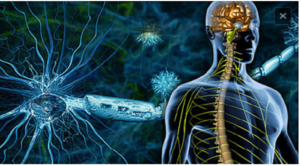
Within a few days of the transplant Storey was able to move his toes, and after four months he could stand unaided.
While Storey still needs a wheelchair for mobility, he calls his progress astounding.
“It’s been incredible,” he says. “I was in a dire place, but now I can swim and cycle and I am determined to walk.”
The Royal Hallamshire Hospital along with hospitals in the United States, Sweden and Brazil, is part of an international clinical trial called MIST that is assessing the long-term benefits of the stem cell procedure on MS patients. Study participants all have relapsing remitting MS (RRMS), and received intensive chemotherapy to completely destroy the patients’ immune systems.
Treatment costs are about the same as the annual cost for existing treatments, and the stem cell treatment does not require the use of new or existing medications.
Prof Richard Burt of Northwestern University in Chicago carried out the first hematopoietic stem cell transplantation for MS in 1995, and is coordinating this current MIST international trial, which began in 2006.
“There has been resistance to this in the pharma and academic world,” Burt says. “This is not a technology you can patent and we have achieved this without industry backing.”
A study published last year involving MS patients in Chicago showed significant reductions in neurological disability, and for some the improvements persisted for at least four years, although there was no comparative control group.
The outcomes of the current international trial will be reported in 2018, and may determine whether the stem cell transplant becomes a standard in the United Kingdoms health care system for many MS patients.
“Ongoing research suggests stem cell treatments such as HSCT could offer hope, and it’s clear that in the cases highlighted by Panorama they’ve had a life-changing impact,” says Emma Gray, M.D., head of clinical trials at UK’s MS Society.
- Published in Corporate News / Blog

